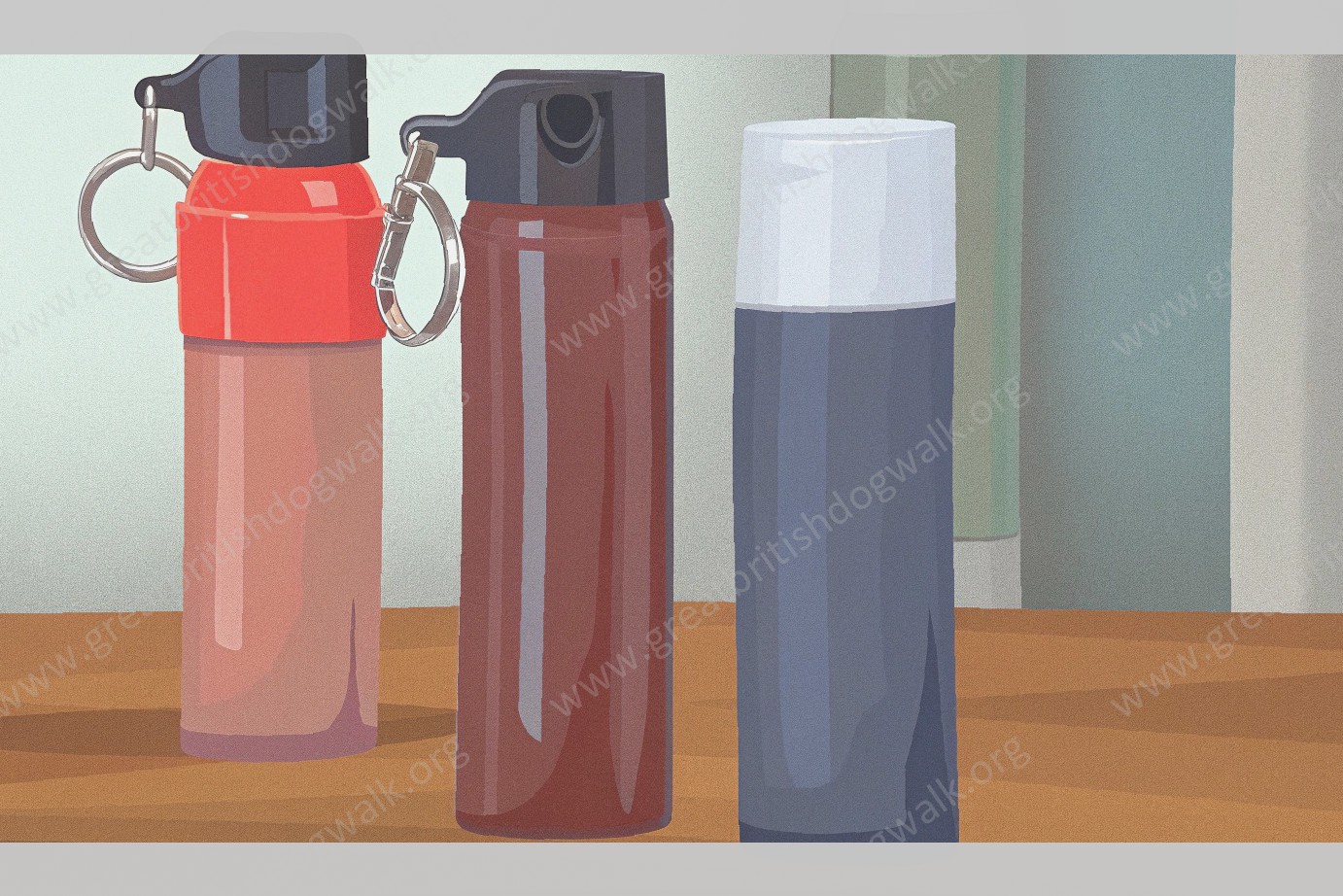Kentucky Pepper Spray Regulations
In Kentucky, the legal status of pepper spray is relatively permissive. There are no state laws that explicitly ban the purchase, possession, or use of pepper spray for personal defense. However, as with other weapons, the law draws lines in the sand — including when you may need a license to carry certain types of pepper spray in certain circumstances.
For example, Kentucky law recognizes three different types of pepper spray:
The key takeaway from this distinction is simple: in order to carry around a chemical incapacitator, which includes not only ordinary pepper spray, but any combination of dye and/or chemical irritants, a person must have a valid Kentucky concealed carry permit (CCW permit). If that sounds like an incredible burden to buy a can of pepper spray, STOP. We do not recommend trying to carry any chemical incapacitator (even if it is one that is otherwise not regulated) without a CCW permit. On top of the additional restrictions that come along with a CCW permit, it is likely that judges will be more merciless toward anyone who injures another while under the influence of a chemical incapacitator. In other words, the self-defense claim will be treated with less skepticism if the incapacitating agent was "ordinary" pepper spray.
A person under age 18 is prohibited from carrying any type of pepper spray unless accompanied by a parent/legal guardian or with written permission of such person’s parent/legal guardian. (It is unclear how this restriction would apply to novelties, e.g., pepper spray keychains!)
There are no separate Kentucky statutes that specifically outline how pepper spray can be used in self-defense. As discussed above , though, differing penalties may be applicable depending on the amount of chemical irritants deployed. It is also important to know the other uses of chemical incapacitators, which include but are not limited to the following:
Paradoxically, while there is no express law prohibiting the use of pepper spray for any other purpose, there is a specific statute addressing the issue of "disturbance" when such agent is used to control animal movements/ejections, and their application becomes subsequently "misused" by a third party:
Additionally, the self-defense statute does speak in general terms about what amount of force is permissible in different circumstances:
The law of Kentucky is clear: you can only defend yourself, others, or property from "imminently unlawful" actions. It is also clear that only reasonable force is justifiable against such attacks. Although the Kentucky courts generally accept the jury instructions on these various matters as the correct instruction in dispositive self-defense cases, it must also be understood that each case is unique and has no direct bearing on future cases under similar facts. While some legal precedent exists to establish a "reasonable use of force" for self-defense, the court has not addressed whether juror instructions on "self-defense" are adequate to defeat false allegations of assault made afterward.
NOTE: if a person reasonably believes another person is about to use chemical agent against him, she may prevent such use with a degree of force just short of death or serious bodily injury.
Who Can Carry Pepper Spray and at What Age
Like many self-defense items, pepper spray does have some age requirements for purchase or possession. In 2019, the Kentucky General Assembly passed Bill 194, which updated Kentucky’s concealed carry laws to include pepper spray as a weapon that can be worn openly. The bill passed with no age restrictions. However, there is an exception outlined in Ky. Rev. Stat. Ann. § 527.030(6).
Under this statute, people who are younger than 18 years old are not prohibited from carrying pepper spray, but they are prohibited from purchasing it. That means that those individuals can legally carry pepper spray, but they cannot legally purchase it. Since many local and online retailers will ask for an ID, there’s a chance few people under 18 can buy pepper spray.
Prohibited Circumstances for Carrying Pepper Spray
The potential for greater harm can be the tipping point that burdens the carry of these products. However, even if such restrictions are in place, persons that do carry these products often do so absent knowledge of the limitations on their use. The information below outlines those situations where pepper spray and other similar products cannot be carried anywhere in Kentucky or areas where certain types of pepper sprays are illegal to carry.
Personal Protection
Under Kentucky law a person is prohibited to carry a deadly weapon.
A person commits carrying a concealed deadly weapon when he or she carries a deadly weapon concealed on his or her person.
"Deadly weapon" means any of the following:
(a) A firearm;
(b) Any weapon of the kind commonly known as a dirk, dagger, slungshot, pistol, sabre, switchknife, knife, bowie knife, stiletto, or any other knife the blade of which is two and one-half (2 1/2) inches in length or longer, except while hunting or fishing;
(c) Any lead pipe, stiletto, blackjack, or any bludgeon or at any instrument of like kind;
(d) Any bludgeon or any other instrument of like kind; or
(e) Any taser, electrical shock weapon or similar instrument designed or intended to cause physical discomfort or incapacitation by the application of electricity or any article, regardless of how it is powered, that is designed to emit an electrical current, laser light, or other discharge to produce temporary or permanent damage, temporary or permanent paralysis or otherwise incapacitates any person.
Exceptions do exist for individuals that hold concealed carry permits for firearms and firearms training.
Schools
Some schools and daycare facilities may have policies against staff or students carrying pepper spray and pepper spray alternatives on school grounds. This might come under district regulations or schoolyard rules. It is advisable to check with your local school district policies or schools before bringing pepper spray to school events.
Government Buildings
Check with the local government office buildings, court houses, police stations, and other administrative buildings you may visit. Certain local government offices may not allow possession of pepper spray or pepper spray alternatives.
Public Gatherings
Those who carry pepper spray or pepper spray alternatives should exercise caution at public events including but not limited to fairs, festivals, concerts, parades, and sporting events. Certain events may not permit the carrying of pepper spray or pepper spray alternatives.
Consequences for Using Pepper Spray Illegally
Given the non-lethal nature of pepper spray, penalties for illegal use tend to be a fine. Law enforcement is given a wide range of discretion, so the formula for calculating fines is not always clear. Additionally, whether or not pepper spray is used in the commission of a separate crime will also play a role in determining penalties. In light of these confounding factors, it is impossible to predict accurate penalties for misuse or illegal possession of this and other personal protection items.
Perhaps more serious than the penalty itself are the potential charges that can accompany ill use of pepper spray. If a person uses pepper spray on another individual on request, this individual may file charges against the pepper-spray user for that illegal action. If the pepper-spray user is a woman , a corresponding charge of assault could be file against the victim by the husband or significant other of the alleged perpetrator. When illegal use of pepper spray and assault of neighboring individuals coincide, assault and battery charges could be filed against the pepper-spray user.
If the pepper-spray user uses pepper spray to move along an unlawful assembly, the pepper-spray user may be arrested for participating in that assembly. If a woman uses pepper spray to prevent rape, that woman may be charged with unlawful physical contact. A large number of other charges are possible, so Under Kentucky Law, Class A misdemeanor penalties for charges of non-lethal pepper spray could be a $500 fine and up to a year in prison per charge. For example, if the pepper spray user were convicted of disorderly conduct by removing a protestor, that person would still be liable for a Class A misdemeanor with the potential of a $500 fine and up to 12 months in jail.
How Kentucky’s Pepper Spray Laws Compare to Other States
The use of pepper spray is restricted in a handful of states, including New York, Hawaii, Michigan, Massachusetts, and New Jersey. In all of these states, a pepper spray license is required to carry any amount of pepper spray. Meanwhile, Kentucky is not one of those states and does not require a permit to carry pepper spray in the same way that New York and New Jersey do. However, it is still illegal to sell or purchase a pepper spray canister over a certain size at retail (this varies from state-to-state). Additionally, though not applicable when carrying pepper spray for personal use, many states prohibit carrying more than a certain amount of pepper spray without a valid permit or technology that would prevent the spray from being triggered such as a lock or leash.
Pepper Spray Safety & Legal Advice
Even though pepper spray is legal in many jurisdictions as an effective self-defense tool, many users often don’t understand the safety and legal implications of using it. Here are some safety tips and best practices for the legal and responsible use of pepper spray in Kentucky: 1. Check the manufactured date and expiration date — even if it’s not expired, take this opportunity to make sure the canister isn’t dented or blocked with any dust or lint that would prevent the nozzle from working. 2. Carry it in a quick and easy location, but avoid anything that’s too quick to access, such as a pocket. Women often find that a purse or cross-body bag works best, while men may attach it to a belt or keep it in a jacket pocket. 3. Test the safety mechanism regularly to ensure it works properly , and make sure the safety mechanism is in the proper position before you use it. 4. Store it in a cool, dry place away from heat sources — even in the southern U.S., many people store their pepper spray canisters outside in their glove compartment to help them avoid heat and humidity. Remember — pepper spray is highly flammable, so storing it in the glove compartment may not be safe after all. 5. Avoid using pepper spray in tight spaces, such as inside a car, or in other areas where the victim might be unintentionally affected by the spray. 6. Aim the spray at the attacker’s eyes to allow the spray to flow toward the victim’s more vulnerable body parts. 7. Do not use pepper spray on police or emergency personnel, even if you believe they are posing a credible threat. 8. Never use on children.



